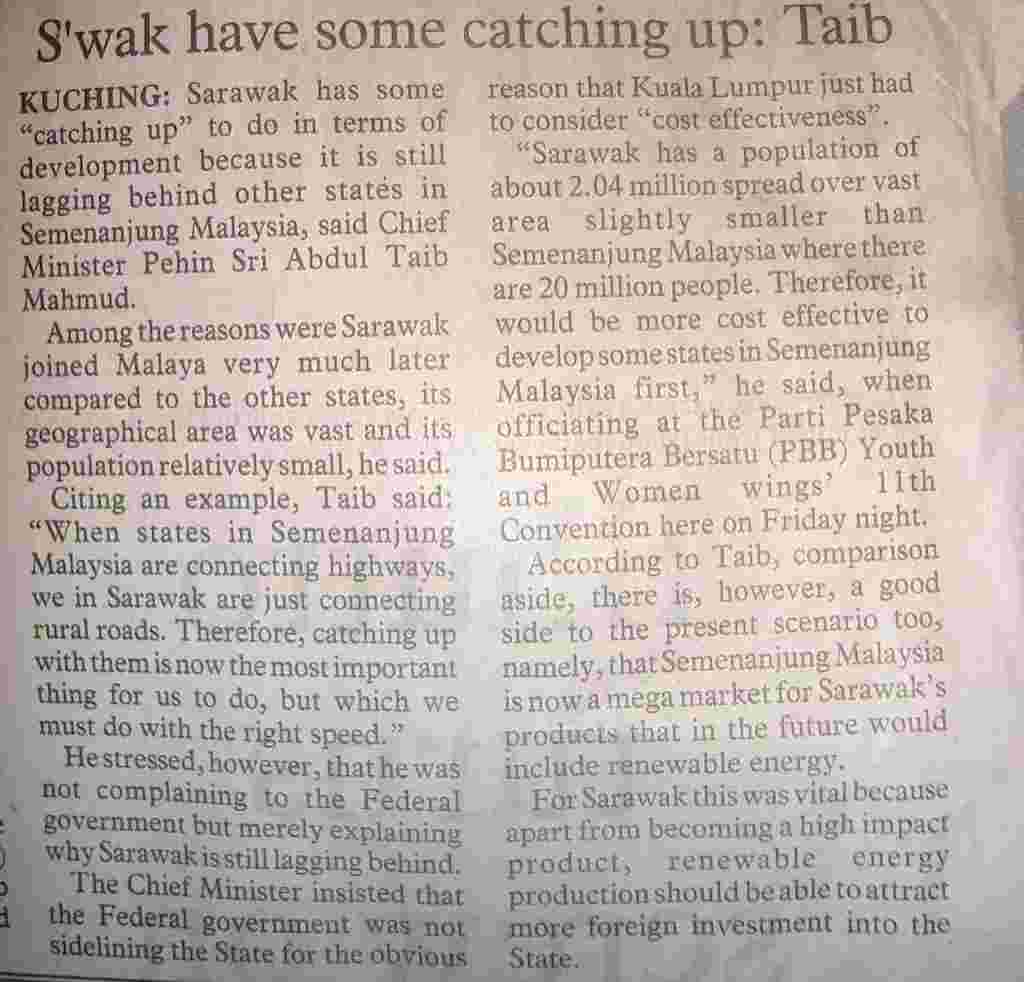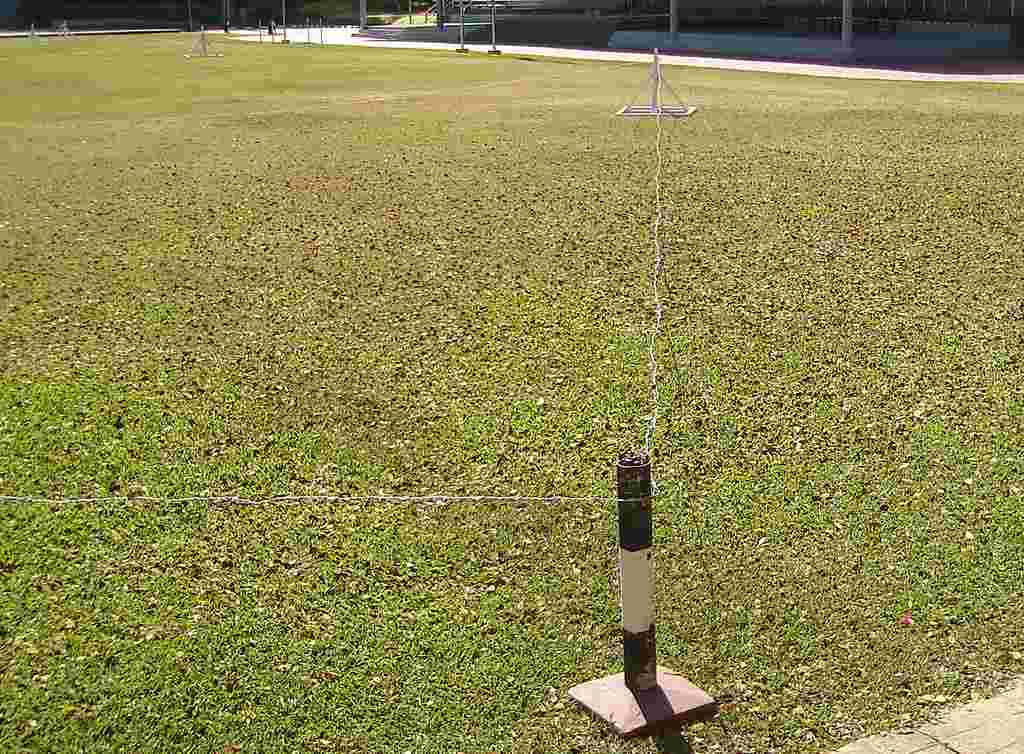Fwd: A very complete analysis of Malaysia Agreement
---------- Forwarded message ----------
From: "Ir. Hj. Othman bin Hj. Ahmad" <othm...@gmail.com>
Date: Dec 31, 7:29 am
Subject: A very complete analysis of Malaysia Agreement
To: soc.culture.malaysia
http://www.freemalaysiatoday.com/fmt-english/opinion/comment/14823-pa...
Pakatan's 100-day plan almost silent on Sabah, Sarawak
Fri, 31 Dec 2010 06:06
E-mail Print
By Joe Fernandez
COMMENT There is nothing particularly exciting for Sabah and Sarawak
in Pakatan Rakyat's 100-day reform plan, hailed as a Complete Makeover
for Malaysia, a National Recovery Plan, a Malaysia Revival Programme
or any other such platitudinous expression it cares to articulate.
The plan is supposed to swing into action from Day One of Pakatan's
capture of Putrajaya.
But except for the 20% oil royalty, any other benefit to the Borneo
states is purely incidental.
PKR, similarly, has paid lip service so far to the Tambunan
Declaration of Oct 7, 2006, under which the party pledged that it was
committed towards the autonomy of Sabah and Sarawak as per the 1963
Malaysia Agreement. Instead the party, just like Umno and Barisan
Nasional, has routinely observed the Tambunan Declaration more often
than not in the breach.
It's high time that Pakatan, and BN too, thought along the following
lines when cooking up something that is supposed to be good for the
nation: "How will this be greeted in Sabah and Sarawak?" Neither
coalition should announce anything until it has asked itself this
question. This will spare it the blushes, if not red faces all around.
It's still not too late for Pakatan to amend its reform plan to
include the Borneo Agenda. A start must be made within the 100-day
period.
Meanwhile, BN should ask itself how it can better Pakatan in Sabah and
Sarawak. It is more than apparent that it cannot be business as usual
for the ruling coalition in Malaysian Borneo. However, media pictures
of Prime Minister Najib Tun Razak screaming his head off, hands
raised, does little to inspire confidence. He comes across as one
scared out of his wits and needing to put on a show of bravado.
As it stands, BN cannot better its 2008 performance in the two states.
At least 10 parliamentary seats each will fall in the two states and
this is sufficient to put Pakatan within striking distance of
Putrajaya. Sabah and Sarawak are in a mood to punish BN in Parliament
even if they get nothing out of it. It must be remembered that it was
the mood-creating effect of Hindraf's Makkal Sakthi wave that helped
take down BN more than a peg or two in 2008.
Bleak spot
In addition, up to a third of the state assembly seats in Sabah and
Sarawak will fall to the opposition. All this is assuming that the
opposition alliance can get its act together and forge a one-to-one
pact in Malaysian Borneo, as in Peninsular Malaysia, to take on BN.
Between Pakatan and BN, it's more than likely that the former will get
a better hearing in Sabah and Sarawak, notwithstanding a troubled
relationship so far, especially in Sabah. It's a fact that the bleak
spot in an otherwise bright picture is that de facto PKR chief Anwar
Ibrahim has been riding roughshod in Sabah on any number of issues.
His pronouncements on the illegal immigrants, for example, don't augur
well for the future of Pakatan in Sabah, if not in Sarawak.
Pakatan should keep on the safe side and rework its reform plan for
Malaysia, this time keeping Sabah and Sarawak in mind.
Of particular interest to the two states is why the compliance
mechanism for the Malaysia Agreement has fallen into disuse even
before it can be implemented.
The suspicion is that the Malaysia partnership ceased to exist with
the departure of Singapore from the Federation in 1965. This issue
needs to be put to rest. It appears that the definition of Federation
in the Federal Constitution is as per the 1957 Federation of Malaya
and not the 1963 Federation of Malaysia. In that case, both Sabah and
Sarawak became independent of Malaysia at the same time as Singapore
but were somehow retained illegally as the 12th and 13th states in the
resurrected Malayan Federation, now masquerading as Malaysia.
Pakatan must be bold enough to announce that it will study whether the
Malaysia Agreement still exists, and whatever the verdict, what's the
best way forward.
Anwar's oft-cited flimsy excuse in private that "the Malays in
Peninsular Malaysia will not stand for autonomy for Sabah and Sarawak"
does not hold water. He seems to be almost conceding that Sabah and
Sarawak are colonies of Malaya. Even the erstwhile Pakatanco-
coordinator, Zaid Ibrahim, who has openly confessed his ignorance,
echoed Anwar on the issue. No one is asking the Malays, or anyone else
in Peninsular Malaysia, anything about the Malaysia Agreement. They
have nothing to do with the issue. This is an issue between Sabah and
Sarawak on one side and the federal government on the other. The only
other party which can enter the picture is the UN Security Council.
Pakatan must also include the Philippines' claim to Sabah in its
reform plan. It is little known that the Sabah claim does not cover
the whole of Sabah, but only the eastern seaboard, which was
traditionally under the Sulu Sultanate, now in the Philippines
Republic, and the northern third, which was handed by the Brunei
sultanate to the Sulu sultanate.
Straightforward case
Sulu transferred its sovereignty over the northern and eastern parts
of Sabah to the Philippines. These parts were leased by Sulu to the
British North Borneo Chartered Company. The company sold the whole of
Sabah to the colonial office in London for 1.2 million pounds after
World War II as it was too broke to repair the war damage caused by
the Japanese occupation. The rest is a brief British colonial history
followed by Malaysia.
Sabah must be kept united and given the right to decide between
Malaysia, the Philippines and independence. This will bring closure to
the Sabah claim and the Malaysia Agreement.
Sarawak is a more straightforward case of non-compliance on the
Malaysia Agreement and its fate will hinge more on which way Sabah
moves. At one time, before Malaysia, Sarawak wanted a Borneo
Federation with Sabah and Brunei. Unfortunately, Sabah saw Sarawak as
a poor economic prospect and rejected the Borneo Federation. Malaysia
entered the picture, but Brunei stayed out of the new federation at
the 11th hour.
Sarawak was independent for more than 150 years before the cash-
strapped Brooke Dynasty handed the kingdom over to the colonial office
in London after World War II. As in Sabah, the government was too
broke to repair war damage. The British should have returned Sarawak
to independence and not force it into the Malaysian Federation.
The acceptance of Pakatan's 100-day reform plan in Sabah and Sarawak
will undoubtedly hinge on the inclusion of the Malaysia Agreement and
the Sabah claim and their resolution one way or another.
As the plan stands, there is little to quarrel with it apart from the
non-inclusion of the Borneo Agenda.


